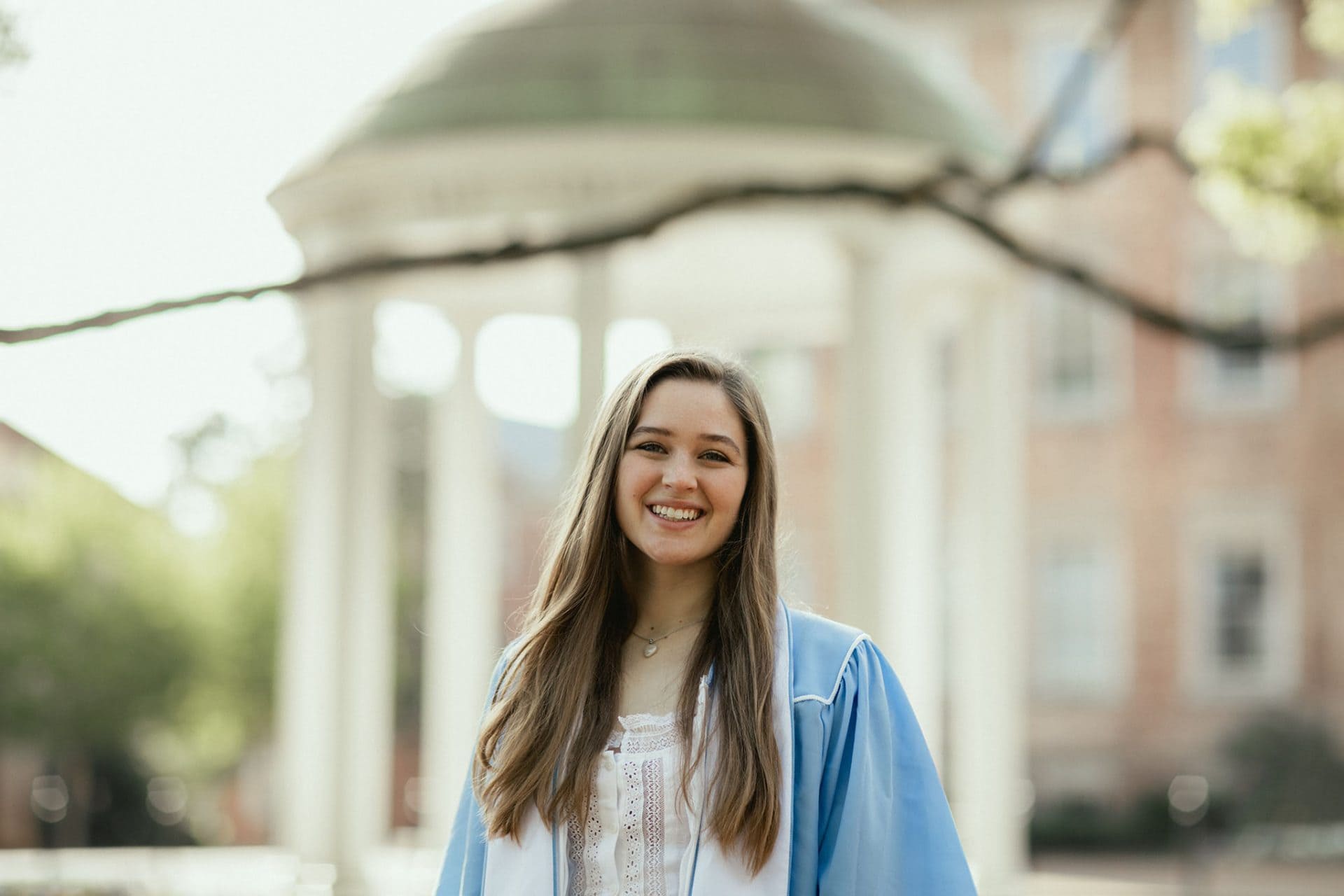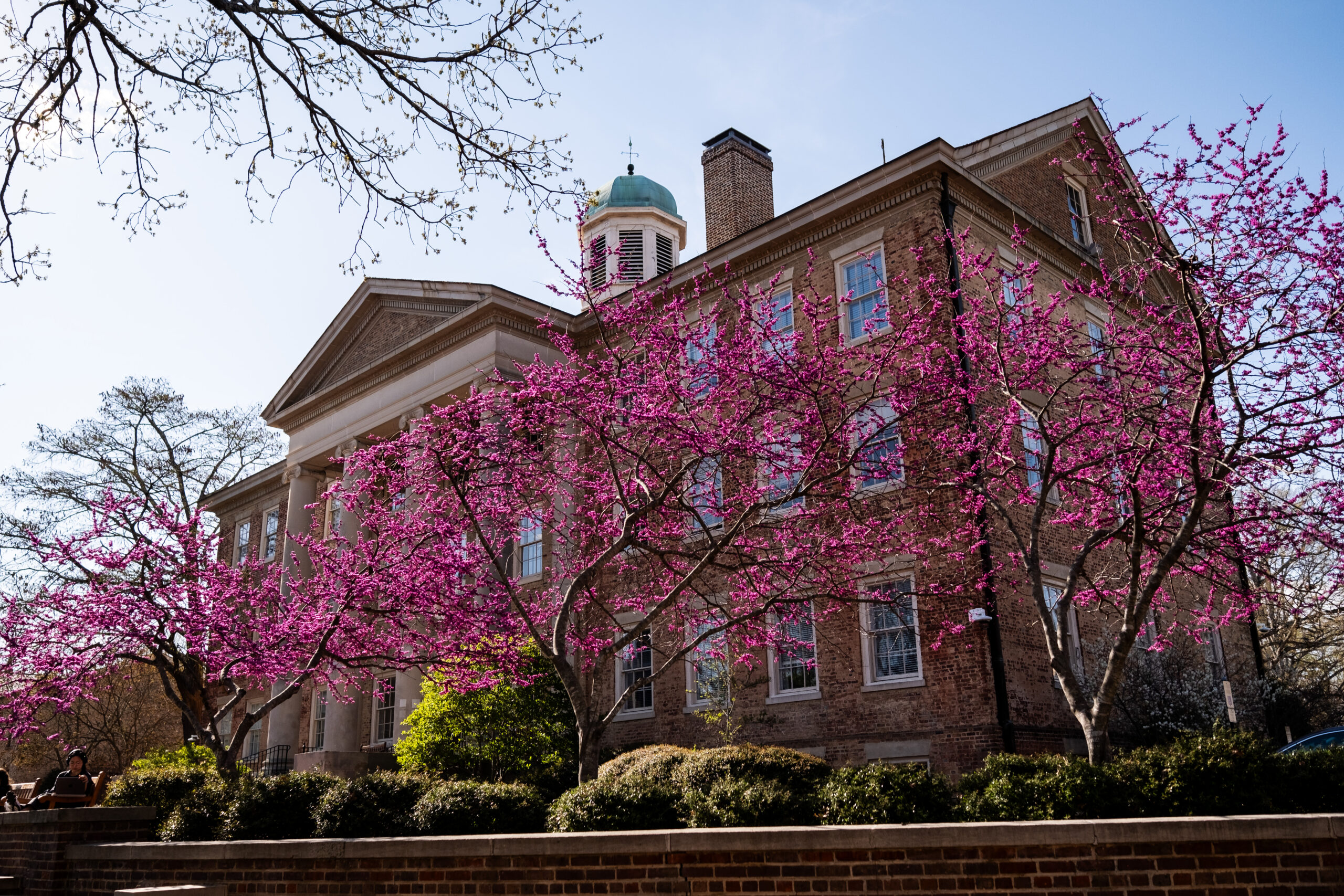
Francie Sentilles ’21 graduated with degrees in environmental health sciences and anthropology with a Hispanic studies minor. (Photo by Caleb Clarke)
Francie Sentilles ’21 of Memphis, Tennessee, has been awarded a grant from the Fulbright U.S. Student Program to conduct a self-designed project in Bahia, Brazil.
The recent graduate plans to research adaptation strategies deployed by artisanal fishing communities following the 2019 oil spill in northeastern Brazil and the ongoing COVID-19 pandemic.
Coastal communities, many of which comprise majority-BIPOC (Black, indigenous, and other people of color) populations, are vulnerable to the earliest and most severe impacts of climate change, according to Francie. Despite the fact that Brazil’s fishing industry annually produces 1.25 million tons of fish and provides 3.5 million jobs, she said high poverty rates and inadequate access to education are common barriers to economic mobility.
“These voices are often overlooked as countries develop long-term climate adaptation strategies,” the alumna said. She plans to develop a framework that would connect stakeholder input and ideas with public health initiatives and national policies related to environmental protection.
Partnering with UNC Gillings School of Public Health, Universidade Federal da Bahia
The Fulbright grant will allow Francie to expand a project she’s been working on since February 2020 in partnership with researchers from the UNC Gillings School of Global Public Health and the Universidade Federal da Bahia in Salvador.
The team is assessing the impact of the 2019 oil spill through a series of questionnaires sent to local fishing communities, as well as other data collection methods.
Francie said the collaboration will inform her surveys of and interviews with community leaders and fishers next year.
“I look forward to learning what strategies, when bolstered by community and governmental support, would be useful for other coastal communities that experience similar economic crises and stressors,” she said.
Researching sustainability, anthropogenic impact
The Summer Enrichment Program (SEP) experiences Francie had as a Morehead-Cain Scholar influenced her decision to pursue a cultural exchange program.
In 2018, she worked as an agroforestry program volunteer at the Iracambi Rainforest Conservation and Research Center headquartered in Minas Gerais. The experience prompted her to seek out research at UNC–Chapel Hill that focused on environmental issues in Brazil.
“That summer played a pivotal role in leading me to the Gillings team and in helping me build the language skills and background knowledge needed for an independent project,” said the alumna, who graduated from Carolina with degrees in environmental health sciences and anthropology with a Hispanic studies minor.
The center, dedicated to protecting the Brazilian Atlantic Forest, provides volunteer and research opportunities in sustainable management, ecology, and conservation.
For her Global Perspective summer, Francie traveled throughout southeast Louisiana and Campeche, Mexico, to research the oil industry’s environmental, health, and economic impact on cities, with a focus on the relationship between shrimp fishing and petrochemical production.
The data she compiled from the internship formed the basis of her senior thesis in anthropology, overseen by her Honors Carolina advisor, Dr. Rudi Colloredo-Mansfeld ’87. The thesis, recognized as the most outstanding capstone project for anthropology in her class, examined how petrochemical workers build economic security amidst a high level of volatility in the global petroleum industry.
“I got to see firsthand the challenges that petrochemical production poses to fishing and other environmentally dependent industries—a theme that will be at the core of my Fulbright research,” she said.
The scholar will begin the nine-month project in spring 2022.
Analyzing national adaption plans with the United Nations
Until she begins the Fulbright project, Francie is interning at the United Nations Framework Convention on Climate Change, funded by the Morehead-Cain through the Professional Experience SEP. (Due to the 2020 travel bans and restrictions during the COVID-19 pandemic, the Morehead-Cain Foundation gave senior Morehead-Cain Scholars the option to defer their fourth SEP in the summer following their graduation.)
Her focus has been on national adaption plans used in less economically developed countries, a topic she said has been germane in forming the groundwork of the Fulbright project.
“Getting to witness emerging mitigation strategies with respect to environmental hazards is at the forefront of my interests, and I’m getting to explore questions and issues I’ll continue to tackle in Brazil,” she said.
In addition to the project, she’ll take Portuguese language and public health courses at the Universidade Federal da Bahia.
Francie will conduct the Fulbright research as part of a Master of Science in Public Health (MSPH) through Gillings, a program she plans to enroll in this August for completion by 2023. The alumna will pursue studies in environmental health sciences under advisor Dr. Amanda Northcross, an associate professor of environmental sciences and engineering.


